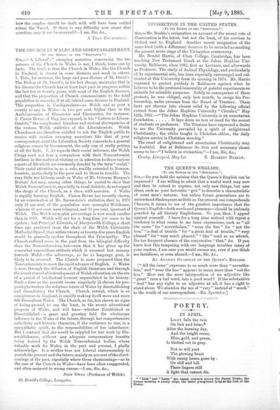THE CHURCH IN WALES AND DISESTABLISHMENT. fTo THE EDITOR OF THE "SPECTATOR." I
Sin,—" A Liberal's" sweeping assertion concerning the impotence of the Church in Wales is not, I think, borne out by facts. The truth is that the Church in Wales, like the Church in England, is strong in some districts and weak in others.
1. Take, for instance, the large and poor diocese of St. David's. The Bishop of St. David's, in his last charge, maintains that in his diocese the Church has at least kept pace in progress, within the last ten or twenty years, with most of the English dioceses, and that the proportion of Church communicants to the total population is scarcely, if at all, behind some dioceses in England. This proportion in Cardiganshire—as Welsh and as poor a county as any in Wales—is two per cent. higher than in the Archcleaconries of Gloucester and Cirencester, for instance.
2. Canon Bevan, of Hay, has exposed, in his "Letters to Liberationists," the complicated blunders and mutual discrepancies of the various Welsh statistics of the Liberationists. Welsh Churchmen are therefore entitled to ask the English public to receive with caution sweeping assertions like that of your correspondent, until the Liberation Society consents to a general religious census by Government, the only way of really getting at all the facts. 3. As regards their social influence, the Welsh Clergy need not fear a comparison with their Nonconformist brethren in the matter of visiting or in attention to those various aspects of life which are commonly denoted by the term" social." Their social attention is, as a rule, readily extended to Nonconformists, particularly to the poor and to those in trouble. The very little use hitherto made in Wales of Mr. Osborne Morgan's Burials' Act may, among other things, be qnoted to show that Welsh Nonconformists, especially in rural districts, do not regard the clergy of the Church, as a class, with aversion. 4. Wales is rapidly learning English. Canon Bevan has recently shown, by an examination of Mr. Ravenstein's statistics, that in 1871 only 21 per cent. of the population were monoglot Welshmen, whereas 45 per cent. were bilingual, and 34 per cent. ignorant of Welsh. The Welsh monoglot per.centage is now much smaller than in 1871. Welsh will not for a long time yet cease to be spoken ; but Principal Edwards, of Aberystwith College, a short time ago predicted from the chair of the Welsh Calvinistic Methodist Synod, that within twenty or twenty-five years English would be generally spoken throughout the Principality. The Church suffered more in the past from the bilingual difficulty than the Nonconformists, but—now that it has given up the somewhat supercilious attitude which it assumed last century towards Welsh—the advantage, as far as language goes, is likely to be reversed. The Church is more prepared than the Nonconformists to meet the rapid advance of English. 5. Wales is now, through the diffusion of English literature and through the recent remarkable development of Welsh education, on the eve of a period of intellectual ferment unparalleled in its history. Such a time as the present seems singularly ill-chosen for proposing to weaken the religious forces of Wales by disestablishing and disendowiug the Church. Church revival, which is so conspicuous in England, is iapidly making itself more and more felt throughout Wales. The Church, so far, has shown no signs of losing ground, to say the least, in the recent educational progress of Wales, and will have—whether Established or Disestablished—a great and growing field for wholesome influence in the Wales of the future, through her comprehensive catholicity and historic character, if she continues to rise, in a sympathetic spirit, to the responsibilities of her inheritance. But I contend that she would be crippled for her work by Disestablishment, without any adequate compensatory benefits being derived by the Welsh Nonconformist bodies, whose valuable work for Wales, in the past and present, I gladly acknowledge. It is neither true nor Liberal statesmanship to punish the present and the future, mainly on account of the shortcomings of the past, especially where those shortcomings—as in the case of the Church in Wales—have been often exaggerated, and often assigned to wrong causes.—I am, Sir, &c.,
Jonw OWEN (Professor of Welsh). B. David's College, Lampeter.


































 Previous page
Previous page